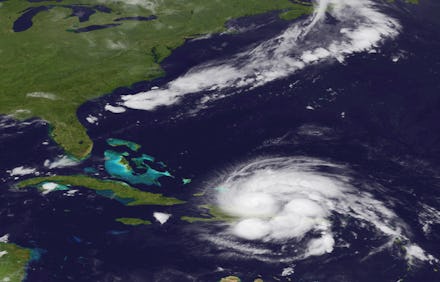What Everyone's Missing About That Viral "Female" Hurricane Study

Our gender bias extends much further than just the wage gap.
More people are killed by hurricanes named after women than after men, according to a study published Monday in the Proceedings of the National Academy of Sciences. Why? Because people don't take hurricanes with female names seriously.
Researchers found that, on average, a hurricane with a male name would kill about 15 people, while an equally severe storm with a female name would kill about 42. In their study, the authors cite one reason for the death toll discrepancy: gender bias. As they write in their paper, "changing a severe hurricane's name from Charley to Eloise could nearly triple its death toll."
The study has caused a battle in the science community, with some researchers disagreeing with the findings, calling it deeply flawed, citing the fact that hurricanes only began taking male names after 1979, around which time they also started becoming gradually less deadly.
As the original research outlines, people assume women are weaker, and this carries over into how they perceive other things given feminine-sounding names, even natural disasters. As a result, the researchers found, people take fewer precautions against hurricanes named after women.
While study coauthor Kiju Jung said the effect was the unfortunate result of the stereotypes people assign men and women, the results point to more subconscious assumptions. When the researchers asked participants outright which storms would be more severe, one named after a woman or one named after a man, an equal number picked the feminine name and the masculine name. But when people were then asked if they would prepare for a storm or follow evacuation orders when one was close by, they overwhelmingly scrambled to get ready for a Hurricane Christopher and largely ignored a Hurricane Christina.
Image credit: NASA
The scientists, from Arizona State University and the University of Illinois, looked at hurricane death tolls and the gender associated with all of the nearly 100 hurricanes that touched down on American soil between 1950 and 2012. Of the most severe storms, those with female names led to an average of 45 deaths, while those named after men killed just 23. (The authors left out two hurricanes: Katrina, which made landfall in 2005, and Audrey, which touched down in 1957, because they were so severe they would have skewed the analysis.)
But there was a small snag: Up until 1979, all hurricanes were given female names. How's that for gender bias? From that point onward, the federal government, which assigns names to hurricanes years in advance of their arrival, decided to alternate hurricane genders annually.
Social scientist and economist Jeff Lazo took issue with this, going so far as to name it one of the reasons for dismissing the results as a statistical fluke. In addition to wrongfully including all storms since 1950, said Lazos, the researchers did not account for the fact that over time, storms have gotten less deadly.
The study authors disagreed and wrote a rebuttal in the comment section below Lazo's post. While they acknowledged that including all hurricanes since 1950 wasn't ideal, it was the only way to get a large enough sample size for the study. Furthermore, they said, when they looked at all hurricanes since 1950, they found that gender played a role even when names were male: The more feminine a name sounded, the more people died.
No, analyzing the relationship between explicitly female versus male names and hurricane preparation with 29 years of female-only names is not ideal. But the study is one of the first of its kind to statistically analyze the relationship between socially assigned gender roles and behavior. And it's a good step toward beginning to look at the real-world implications of living in a society that still can't be honest about how it really thinks of women.